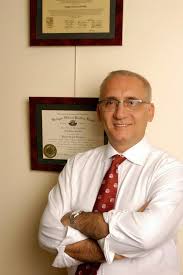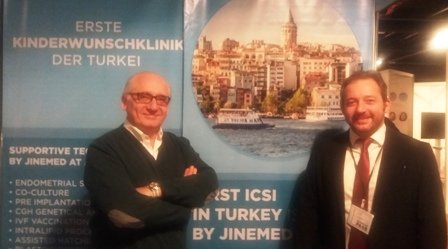Fertility treatments in Turkey and fertility food
(and why Turkish women believe that onions help while trying to conceive)
During a recent fertility conference in Berlin, I spoke to numerous fertility experts, but only at the Turkish booth did it feel like home to me. Or, more precisely, it felt like sitting in my own kitchen – a peaceful, comfortable world, untouched by the hectic surroundings.
Would I like a coffee? No? Then have a chocolate. Sit down. Let’s talk. Let’s figure things out. This is how I started taking to Dr. Teksen Camlibel from Jinemed, the first IVF center in Istanbul.
Dr. Camlibel, why do German patients go to Turkish fertility clinics? What is it that you offer that they can’t get in their homeland?
Dr. Calimbel: We have many German – Turkish couples. Many of them are happy to take advantage of our high-tech clinics (my comment: Turkey has very good reputation in the field of reproductive medicine) while combining treatment with holidays and keeping their privacy at the same time. In this sense, language and culture do play a role. To this, we offer to our couples methods such as preimplantation diagnostic and egg donation which are difficult and often even impossible to get in a complex legal environment such as Germany.
 Me: Dr. Calimbel, you are a fertility expert and a medical doctor with great experience also in successfully treating couples after several IVF failures. So, I will ask you one of the most difficult questions in reproductive medicine and also one of the questions that I’m asked by women. When you have a patient who is in advanced reproductive age, say 42 and with very few eggs left, what would you recommend to her? What is the way to go in order to not waste time and maximize the chances of success?
Me: Dr. Calimbel, you are a fertility expert and a medical doctor with great experience also in successfully treating couples after several IVF failures. So, I will ask you one of the most difficult questions in reproductive medicine and also one of the questions that I’m asked by women. When you have a patient who is in advanced reproductive age, say 42 and with very few eggs left, what would you recommend to her? What is the way to go in order to not waste time and maximize the chances of success?
Dr. Calimbel: Egg pooling. I personally find egg pooling better than embryo pooling. Both processes take time, say 1 – 1.5 years to finish; this is a hard and exhausting time, during which even a husband can change (laughs)…
Infertility is hard, and some relationships don’t survive. But we manage to make a pool of, say, at least 10 eggs; then, we still can take sperm of whoever is supposed to be the father, inject eggs with it, and transfer embryos.
Me: Is there anything in terms of lifestyle interventions that couples can undertake while waiting for IVF in terms of improving egg and sperm quality and generally increasing their chances to get pregnant?
Dr. Calimbel: Like in all other aspects of life, various lifestyle modifications such as diet or targeted supplement intake will have effect on reproductive system. It’s important for both women and men to try to achieve optimal BMI prior to the IVF. Also, long-term smoking is bad as it destroys fine DNA structure in the ways that we’ve only begun to understand. We also often give DHEA to our older patients.
And there is one more thing. In Turkey, there is one chemistry professor who became very popular with his onion soup recipe (see details below) for women with infertility issues and, in particular, women with PCOS. In our media there are many supposedly success stories by women who made positive experiences with drinking onion extract. While I’m not aware of any research seriously supporting this belief, but when my patients insist on trying this out, I say, go for it.
I try to stay open for everything, only in that way we can make progress. We all know that about 20% of all infertility cases have “unknown” origin. But, in recent years, we’ve learned about immune and other factors which can cause infertility and even have tests to address some of them. Or take this example – some years ago we believed in genetics very much and were told that genes are something like the Constitution, unquestionable and true. And now we know so much more about epigenetics and how our genes become modified in response to our environment.
Even embryos themselves seem to be much more robust than what we believed so far. An embryo can be stamped as “chromosomally abnormal” on the day three and then become totally “normal” on the day five, ending up in a healthy pregnancy and baby. In other words, embryos try to heal and repair themselves. Depending on the amount of “damage,” this process often fails, but sometimes embryos really surprise us with their vitality. There is still for all of us a lot to learn there.
Thank you for this awesome wealth of information!
PCOS Friendly Recipes in 2021 – natural way to boost fertility
Onion soup for PCOS:
How to make an onion extract (should be very helpful for women with PCOS as well as women with irregular cycles, but also generally beneficial for ladies who are trying to conceive).
Take a medium-sized brown onion (not red or purple, brown only), peel off the outer layer, and slice the whole onion into 4-6 pieces.
Boil two glasses of water and add the onions when the water starts to boil. Boil the onion (covered) for 5 minutes. Wait for the juice to cool down. When it is warm enough to drink (not hot and definitely not cold), pour it through a sieve into a glass (you only drink the juice).
Do this twice a day, shortly before lunch and dinner for 15 days. Start the process just after your period, repeat for 3–4 cycles, see what happens.
You have to boil fresh onion juice each time: don’t drink a pre-prepared one! In Turkey, women are convinced that this fights cysts and helps regulate periods and makes getting pregnant easier.
See you soon,
Darja[/vc_column_text][/vc_column][/vc_row]








